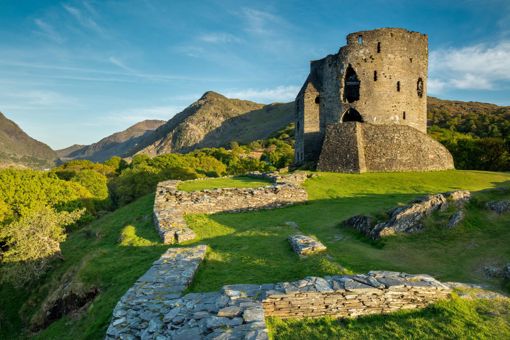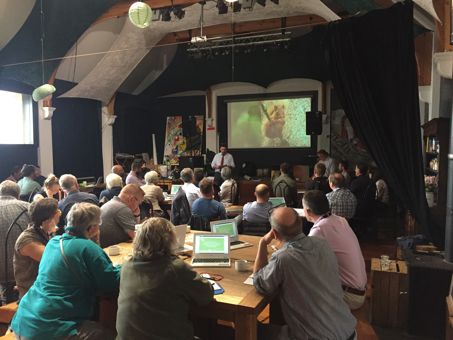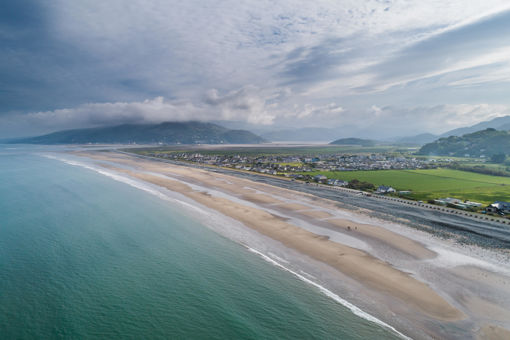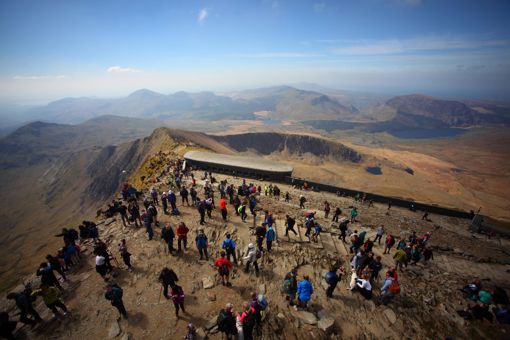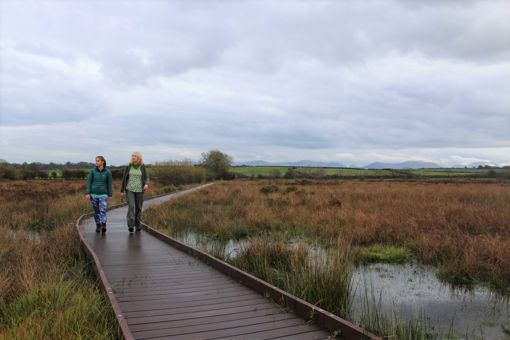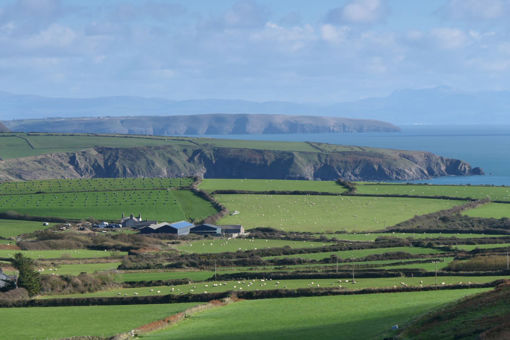Encouraging a sustainable economy
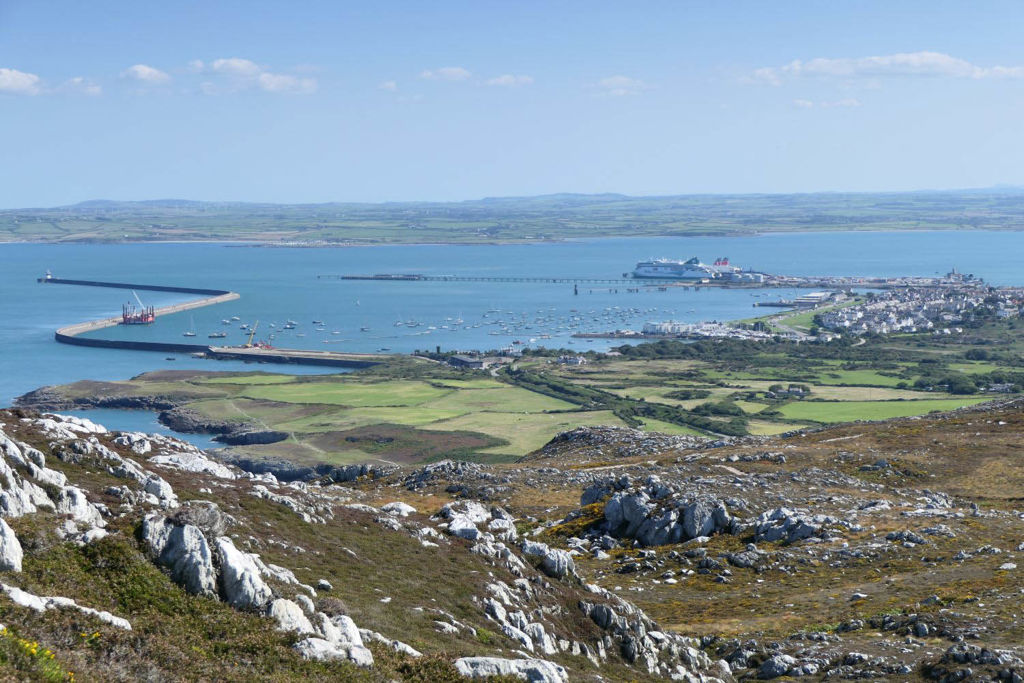
Encouraging a sustainable economy
In this theme Natural Resources Wales (NRW) want to work with partners and stakeholders to maximise employment opportunities for the people who live-in North-West Wales. The challenge is to develop a local economy that provides secure, well-paid jobs that enhance Wales' natural environment. Any economic activity that damages the environment on which we all depend, threatens the very thing that makes North West Wales unique. We collectively need to put nature and sustainability at the heart of any green recovery. We want visitors and locals to make the most of the amazing landscape, but that must happen in a way that meets the needs of farmers, local communities and the outstanding habitats.
This links closely to the theme on sustainable land management where priorities include creating markets for locally sourced food and public sector purchasing of local goods and services. Other community driven schemes can also contribute to Wales' sustainable economy, for example: energy, transport and tourism at a local level.
This theme highlights the need for working in partnership with others to improve relationships and understand the role of the environment and agriculture as well as other industries in underpinning the economy of North West Wales. This includes encouraging a local circular economy, reconnecting people with locally sourced food and other products and the development of more renewable energy projects, including community-based energy schemes where appropriate. This includes the role of procurement and opportunities to facilitate local sourcing in the region things like food into schools and hospitals.
Why this theme?
To facilitate the development of the Area Statement, Natural Resources Wales (NRW) held three workshops in North West Wales during July 2019 and a session for staff. A further workshop session with staff in November 2020 was held online followed by online sessions with stakeholders in December 2020 . From on these discussions, it is clear that there is continued support for 'Encouraging a Sustainable Economy' theme among the stakeholders. More information and detail on this can be found in the 'Introduction to the Area Statement' and in the 'Ways of Working' theme. We have also established an online Thematic Focus Group to help collaboration and development of this Theme.
To inform this theme we have considered:
- Local knowledge from a series of structured independently facilitated workshops from across North West Wales.
- Establishment of an on-line Thematic Focus group
- The priorities set in the Natural Resources Policy; Delivering Nature-Based Solutions, Increasing Renewable Energy and Resource Efficiency, Taking a Place Based Approach
- Information from the State of Natural Resources Report (SoNaRR) on ecosystems and their resilience, and the risks to the benefits they provide
- The well-being assessments and plans, and the priorities that are emerging through Gwynedd and Anglesey and Conwy and Denbighshire Public Service Boards’
External stakeholders highlighted the need to:
- Identify opportunities to mitigate the potential effects of tourism and understand how visitor numbers impact on the area’s natural environment. This includes the consideration of the merits of initiatives such as a green tourism tax for reinvestment in the area and managing visitor pressure at some of our most prestigious, honey pot sites in North West Wales
- Look for opportunities to work with partners to ensure that popular tourism sites share economic benefits with their surrounding communities e.g. Newborough, and actively manage the impacts of over tourism
- Explore the range of opportunities to extend tourism across the whole of North West Wales, including help for business to expand their capacity to reconnect tourists with the natural environment so they too understand and care
- Understand the role that agriculture has in underpinning the rural economy in North West Wales particularly to address the loss of rural key skills associated with traditional land management. Work with others in understanding the impacts of changes in farming and how fundamental farming is to the rural community and its economy
- Encouraging routes into employment for young people in the area, while also recognising the need for opportunities for local people of all ages
- Increase efficiency, promoting local procurement and supporting renewable energy
- Encourage local and sustainable goods and services production
- In addition to initiatives that encourage a sustainable urban economy, Wales need needs greater focus on the rural economy, encouraging rural jobs that engage people within their local rural environment, such as farming, forestry and horticulture. Creation of local employment opportunities to encourage young people to stay in rural areas. Supporting the marketing of high-quality products based on environmentally friendly practices. Sharing best practice from the best of local food projects and cluster marketing
- Exploring opportunities to link hi-tech developments with existing businesses that will make those businesses and the environment more resilient
- Ensure the focus for farming subsidy supports both farm businesses, local communities and environmental objectives
- Champion the development of an economy that links to Welsh Government aspirations, policies and strategies around the circular economy e.g. ensure that information on the sources of products are made available, and information and support over alternatives to plastics is available for local businesses and industry. Embed National Policy of “using anchor organisations (public sector) to fund and support the foundational economy of the area” (which will include the production of food and tourism)
- Encourage businesses and communities to sign up to initiatives such as the Conwy and Denbighshire PSB green pledges
- Encourage and reward a change in mindset and behaviour through education campaigns, awareness raising activities and an accreditation or award scheme for businesses that support the circular economy
- Facilitation of innovation in the rural economy. Consider how investment now will provide a basis for a future sustainable economy. Development of initiatives that build on the best of initiatives Funded through the Rural Development Plan for Wales (RDP) as part of the Welsh Government and European Agricultural Fund for Rural Development. LEADER 2014 - 2020 programme. (RDP / Leader)
- Consider public sector procurement across the Public Service Boards – who could be buying more local goods and services?
- Changes are needed to the “functional need” element of planning policy, this is seen as critical to developing a sustainable rural economy. Current planning policy favours movement of people to urban fringes – this stifles sustainable rural economies
- The changing infrastructure required to support changes in trends around car tourism such as the need for electric car charging points and alternative sustainable modes of travel to and around the area
Key points from assessment of data and evidence from the area profile:
- In 2017, Conwy was reported to have 4,120 active enterprises which had declined to 4,075 by 2008. Gwynedd was reported to have 4,530 active enterprises declining slightly to 4,460 in 2018 and in 2017, Anglesey reported 2,095 active enterprises increasing to 2,115 in 2018
- In 2017 there were 1226 farming / horticultural enterprises recorded on Anglesey, 1271 in Gwynedd and 1074 in Conwy
- In 2009 there were 3,100 tourism enterprises on Anglesey, by 2018 this had increased to 4000. In 2009 there were 7,700 tourism enterprises in Gwynedd and by 2018 this had increased to 9000.In 2009 there were 7,100 tourism enterprises in Conwy, by 2018 this had increased to 8,500
Overall between 2009 and 2018 tourism enterprises have increased by 20% in North West Wales.
Further research and work is needed with all sectors, including consultants and universities, to explore the potential of developing a sustainable, vibrant rural economy for North West Wales in-line with stakeholder feedback.
 © Crown copyright (2019) Wales
© Crown copyright (2019) Wales
Opportunities identified related to this theme
All of the opportunities identified below will only be supported at environmentally appropriate locations.
Economy
- Better understanding the role of agriculture and other rural enterprises in underpinning the rural economy
- The opportunity to work with existing forums and networks to support the rural economy agenda
- Increase opportunities for employment through educational provision of rural skills
- Increase opportunities for green energy initiatives where appropriate
- Consider how the planning system can support a sustainable rural economy
- Consider how investment now will provide a basis for a future sustainable economy
- The development of initiatives that build on the best of RDP/Leader and work with others to explore funding opportunities available for sustainable rural enterprises
- Encouraging rural jobs that engage people with their local rural environment such as farming, forestry and horticulture
- Supporting the marketing of high-quality products based on being environmentally friendly, e.g. sharing the best of local food projects and cluster marketing
- Developing sustainable local timber markets e.g. developing local tree nurseries and establishing the right quality of woodlands to meet the demand of local housing markets
Sustainable tourism
Create a vision and implement a sustainable tourism plan for North West Wales that identifies the opportunities for:
- A green tourist transport infrastructure
- Fair and local accommodation that benefits local communities
- Food outlets using locally sourced produce
- Marketing materials aimed at likely audiences with inspiring ideas and timely and accurate information that people can act upon
- Working with others to minimise visitor pressures on North West Wales sensitive iconic sites
- Supplemental business support/contracts that support the tourism industry when visitor numbers are low
- Working with existing networks and forums to support this agenda
- Working with others to improve access to the outdoors and promote sustainable tourism so that visitors are reconnected with the environment and the local economy benefits
- Creatively connecting tourism businesses with their local environment, including interpretation, education and volunteering opportunities that encourage greater understanding of the natural environment and local landscape
- Working together to develop sustainable tourism utilising our natural resources resiliently and contributing to a healthy local economy
- Working together to manage and review tourism hubs for their future sustainability and consider what mitigating actions are needed if they are assessed as no longer sustainable
- Exploring opportunities to work with existing tourism providers to highlight and increase awareness and understanding of the local environment
Sustainable transport
- Working with others to ensure Wales' economy does not continue to cause environmental degradation
- Working with others to develop innovative solutions to reduce the high levels of road transportation of materials, people and goods
- Working with others to develop an integrated managed transport system that will underpin a sustainable economy. Evidence collation and looking at other examples of best practice e.g. the Snowdon Plan with other interested organisations to improve our collective understanding of the way in which people visit their local environment or tourism activity, exploring how to manage access to the environment more efficiently and sustainably into the future through reviewing the public transport system, parking and access across North West Wales. Transport links for commuting also needs further consideration especially as more young people are priced out of the car ownership market
Sustainable goods and services provision
- Working with stakeholders engaged in the 'Prosperity For All' economic action plan to find sustainable innovative solutions for the rural economy of North West Wale'
- Encouraging a local circular economy, connecting people with locally and sustainably sourced timber, food and products through branding of local quality produce
- Working with others to encourage the development of local supply chains, increase efficiency, promote local procurement and support renewable energy where appropriate
- Work with the PSBs and public sector bodies to consider solutions to low levels of local employment in public sector commissioning
Overcoming issues together
- Develop a Sustainable Economic Strategy for the Region - work with existing forums and networks to support the rural economy agenda including a better understanding the role of agriculture and other rural enterprises in underpinning the rural economy, and consideration of how the planning system can support a sustainable rural economy.
- Sustainable Tourism - Create a vision and implement a sustainable tourism plan for Northwest Wales which considers green tourist transport infrastructure, working with others to minimise visitor pressures on North West Wales sensitive iconic sites food outlets using locally sourced produce and short supply chains.
- Sustainable Goods and Services - Working with stakeholders engaged in the 'Prosperity For All' economic action plan to find sustainable innovative solutions for the rural economy of North West Wales'and encouraging a local circular economy, connecting people with locally and sustainably sourced timber, food and products through branding of local quality produce. Work with the PSBs and public sector bodies to consider solutions to low levels of local employment through public sector commissioning.
- Sustainable Transport - Working with others to ensure Wales' economy does not continue to cause environmental degradation, including working with others to develop innovative solutions to reduce the high levels of road transportation of materials, people and goods. Working with others to develop an integrated managed transport system that will underpin a sustainable economy. Improve our collective understanding of the way in which people visit their local environment or tourism activity, exploring how to manage access to the environment more efficiently and sustainably into the future through reviewing the public transport system, parking and access across Northwest Wales.
- Identified Gaps - including Sustainable Housing developments that link with Active Travel and local green space and include opportunities to use green transport to commute to work as well as changes to flexible working. Work to explore Nature Benefitting Businesses - putting nature at the heart of the business model.
What would success look like?
- A local economy that provides secure, well-paid jobs that enhance the natural environment
- Local Authorities, Welsh Government and the North Wales Ambition Board working closely with the North West Wales business community to help the North West Wales sustainable economy thrive
- Education, the environment and business go hand in hand. Business opportunities are sustainably developed, offering good opportunities to a diverse working population
- Key rural skills associated with sustainable land management thrive in North West Wales
- Public services and people benefit from a vibrant rural economy. Natural resources are utilised sustainably in a circular local economy
- Locally branded and sustainable produce are sold locally to a range of different consumers with different needs and interests, from ‘appropriately priced’ products to premium products
- Review and pilot locally accessible and reliable greener transport infrastructure supporting the local community and those who visit the area e.g. Bws Llyn
- Local rural businesses have their energy needs met from sustainable renewable sources within North West Wales
- Tourism enterprises are graded and marketed on their sustainable contribution to the environment and local economy
Benefits
There are multiple benefits for both people and wildlife that can be derived from a sustainable rural economy. Ensuring that natural resources are sustainably managed will support rural businesses now and for future generations. A vibrant North West Wales economy and public services can have a reciprocal relationship where they support and underpin one another. Encouraging a local circular economy will reduce supply chains and ensure that money remains within the local rural areas. Partnerships between the environment, education/learning sector and businesses will help ensure that rural jobs are skilled, rewarding and well-paid. This will help retain young people in the area and ensure employment opportunities for people of all ages.

Who have we worked with to date?
- Invitations were sent to over 450 people and over the three workshops held, 100 people attended and contributed to the discussions. Natural Resources Wales (NRW) has developed the theme at those events and have been trying different ways to communicate with stakeholders to encourage continued involvement and interest in the local Area Statement
- A second round of workshops were held between November and December 2019 to build on the previous discussions. We have also spoken with partners and listened to their thoughts and feedback including National Parks Authority meetings, farming union meetings and PSB workshops to help develop the content of the themes
- Over 500 invites went out for the second round of workshops in November and December 2019 with over 100 people in attendance.
- A series of online workshops were held in November and December 2020 where further discussions were focussed around each theme.
- A further online exercise was held for focus group members in February 2022 to help build on the information.
What are the next steps?
We have established an online members area and thematic subgroup to develop the area wide vision for this theme – with a broad remit and wide representation. Collectively we will identify potential partners and interested individuals/groups, gaps in knowledge and linkages with local strategies and action plans and project development ideas.
We will use the information gathered during the stakeholder engagement events (external, internal, with partners such as the Gwynedd and Eryri Sustainable Visitor Economy Task and Finish Group and Conwy County Borough Council) to guide the activities of this thematic focus group.
The Focus group will need to review what information and data we have so far, plan who we talk to next, look for theories of change, identify barriers and how to overcome and explore opportunities for appropriate action. The Area Statement will be an iterative document that will change and evolve over time. The group will be responsible for determining when plans need to change and who needs to be involved in that process.
Since 2021, we commissioned Nearly Wild to work on a project looking at the businesses that exist which benefit nature in the Conwy Valley area, and what potential there was to work with this sector to develop opportunities in relation to the Area Statement theme of sustainable economy and the green recovery. We now have a much more comprehensive understanding of nature-benefiting businesses in the Conwy Valley area – where, what type, what scale etc. There was a very positive response from the businesses we approached; most of them took the time to accept our phone calls and talk to us.
We now understand that these businesses want there to be much more visibility for this nature-friendly approach to commercial activity, so that more people might choose to work in this way. The active networking by Nearly Wild through the project has built new relationships between businesses, as well as strengthened or renewed relationships between others. The willingness to work together was very apparent, based on the business owners quickly identifying areas of complementarity.
The zine [ insert link] provides a very clear ‘shopfront’ for these businesses and their nature-benefiting approach to commercial activity; it is, to our knowledge, the first time that the area’s economy has been viewed from this perspective, and a means to show its strength, diversity and commercial viability.
The work further validates this way of considering economic activity, providing many more examples of how this approach to business enables people to achieve long-lasting livelihoods in a way which benefits nature, communities, and local economies.
Building on this and other work, we will be able to engage with and enthuse a broader group of stakeholders beyond the wider environmental sector in a targeted way and with a stronger focus on involving and engaging local groups and individuals. This could mean a variety of approaches, developing our work through on line meetings, social media, traditional media, attendance of existing group meetings, community meetings, drop-in sessions and utilising the strengths of our partners so that we’re all working together to deliver the Area Statement vision and ambitions.
How does what we’ve proposed deliver Sustainable Management of Natural Resources (SMNR)?
Ensuring that natural resources are sustainably managed in business planning and development will support rural businesses now and for future generations. A vibrant rural economy will underpin rural public services. Encouraging more skilled sustainable rural jobs will help re-engage people with their local environment. Encouraging a local circular economy will reduce supply chains and ensure that money remains in local rural areas. More diverse rural employment could lead to less commuting and pressures on the transport infrastructure. Greener transport initiatives should be built into new developments ( e.g. Active Travel links to green spaces close to where people live and work). Digital connectivity to allow flexibility of home working for people in more rural areas with poor mobile coverage encouraging economic diversity.

How do people get involved?
We welcome opportunities for the public to engage with us at any stage of the Area Statement process.
There is also a feedback form and an Email address: northwest.as@cyfoethnaturiolcymru.gov.uk should you wish to write to us with your ideas for developing action under this Theme.
To help as the facilitators of this process, NRW will:
- Work on certain aspects of the conversations that came out of the Area statement stakeholder engagement that identified opportunities and challenges to trial different approaches and develop new ways of working.
- Support the Focus Group through the online Teams members area and face to face meetings for example, contributing to the Gwynedd and Eryri tourism economic strategy.
- Work with others to feed into Plans and Policies based on the Area Statement Opportunities.

